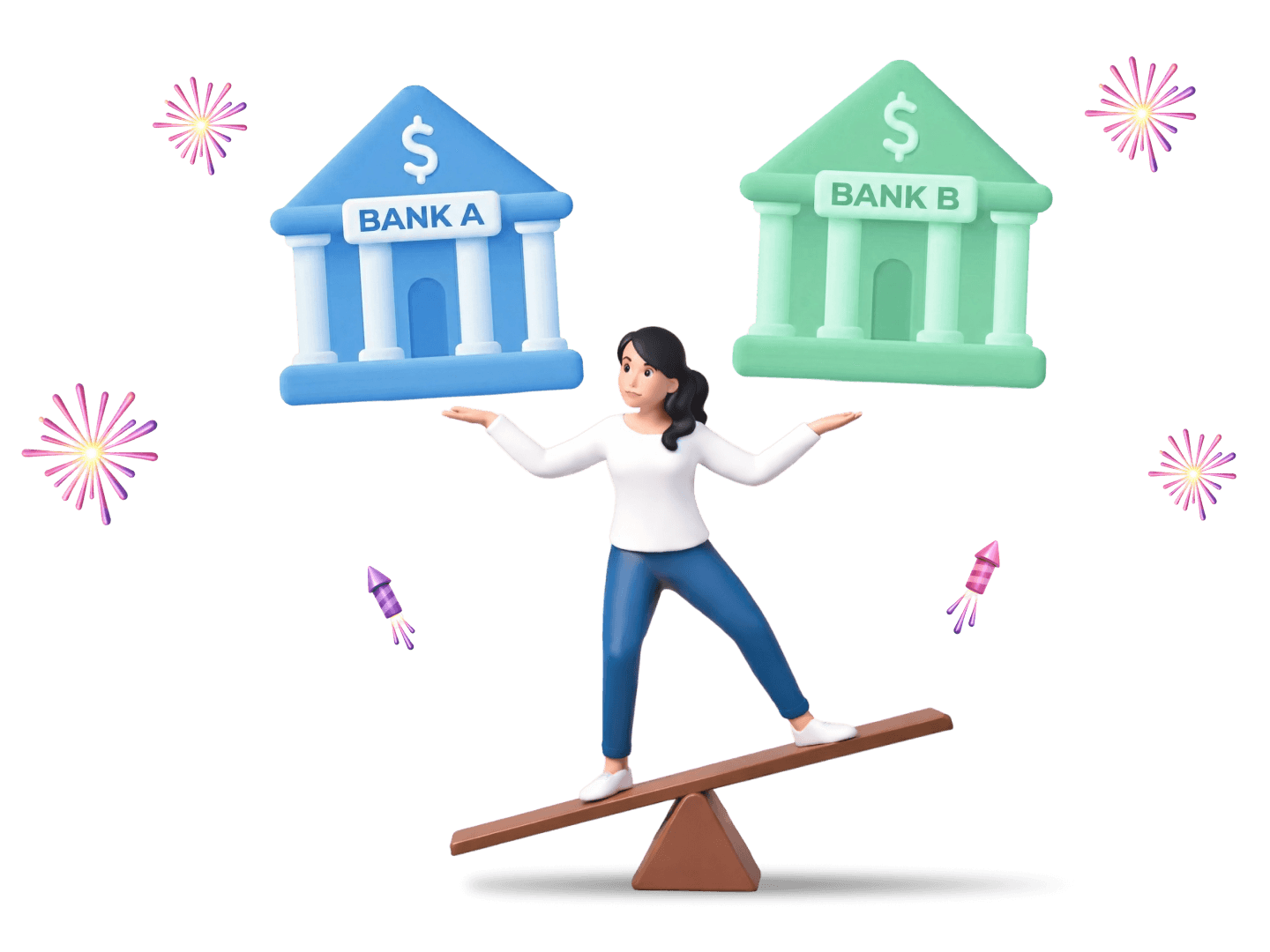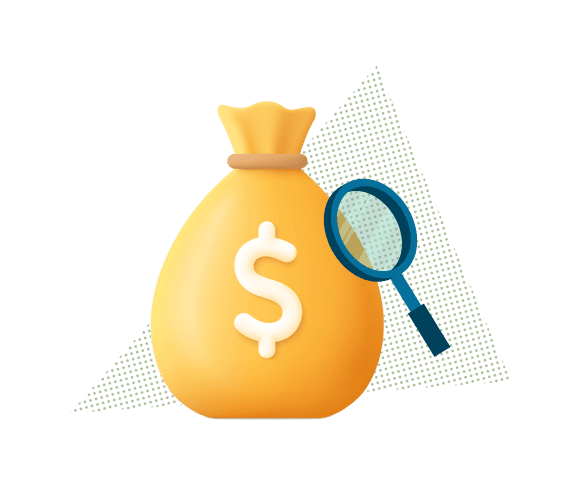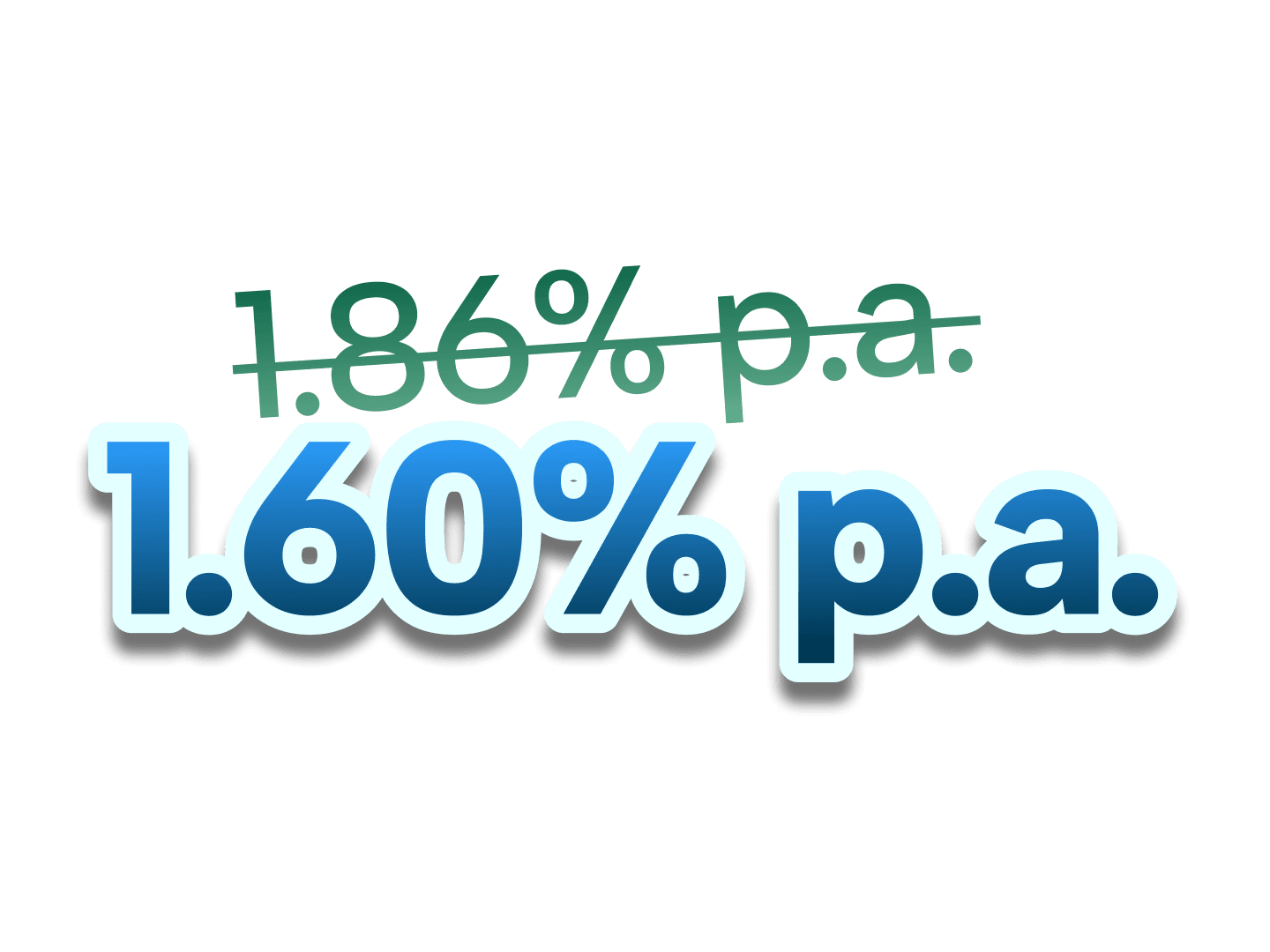How to Get a Personal Loan in 7 Steps, A Singapore Guide
Updated: 24 Feb 2026
Written bySingSaver Team
Team
The information on this page is for educational and informational purposes only and should not be considered financial or investment advice. While we review and compare financial products to help you find the best options, we do not provide personalised recommendations or investment advisory services. Always do your own research or consult a licensed financial professional before making any financial decisions.

SingSaver Personal Loans Cashback Offer
Enjoy interest rates as low as 1.08% p.a. (EIR from 2.09% p.a.) and up to S$4,900 in cashback when you apply for a personal loan via SingSaver. Valid till 1 March 2026. T&Cs apply.
1. Check your credit score
Before applying for a personal loan, check your credit score to understand your financial standing. A higher credit score improves your chances of approval and helps you secure lower interest rates, while a lower score may result in higher borrowing costs or loan rejection.
In Singapore, banks and financial institutions use the Credit Bureau Singapore (CBS) credit score to assess your risk level. Scores range from 1,000 to 2,000, with higher scores indicating lower default risk.
Here’s a breakdown:
-
1911 – 2000 (AA): Lowest risk, highest approval chances
-
1844 – 1910 (BB): Low risk, good approval chances
-
1825 – 1843 (CC): Moderate risk, some lenders may charge higher rates
-
1813 – 1824 (DD): Higher risk, approval depends on lender policies
-
1000 – 1723 (HH): Highest risk, limited loan options
Your credit score is based on your past borrowing behavior, repayment history, and other financial habits.
>> Want to know exactly what lenders see when they assess your creditworthiness? Here’s a breakdown of what’s on your credit report.
If you’re still not sure of what else to consider before applying, read our blog on the five key things to look out for when taking your first personal loan.
2. Estimate your loan payments
Before applying for a personal loan, it’s important to understand how much you’ll need to repay each month. The key factors influencing your loan costs include the loan amount, interest rate type, and tenure.
In Singapore, personal loan interest rates vary depending on the lender and loan type. Here are the main types:
-
Applied interest rate – The advertised rate that reflects the basic cost of borrowing but excludes processing fees and other charges.
-
Effective interest rate (EIR) – A more accurate measure that accounts for additional fees and repayment frequency, providing a clearer picture of the total loan cost.
-
Term loan rates – Fixed or variable interest rates for lump-sum loans repaid over a set period (typically 1 to 7 years).
-
Revolving loan rates – Higher interest rates applied to flexible credit lines that allow repeated borrowing and repayment.
-
0% interest loans – Some lenders offer promotional 0% interest loans, but these often include hidden costs like processing fees or early repayment charges.
To get an accurate estimate of your potential loan repayments, use SingSaver’s Personal Loan Calculator here. Unlike traditional loan calculators that require you to input an interest rate, SingSaver’s calculator generates a list of personalised loan options, interest rates, and repayment plans based on your details.
Simply adjust the loan amount and tenure to find a repayment amount that fits your budget. Keep in mind that the calculator provides an estimate — your final interest rate will be determined by the lender based on your financial profile.
Struggling with multiple loans? A debt consolidation plan may help you manage repayments more effectively.
Best personal loans in Singapore
Looking for the best personal loans in Singapore? Compare interest rates, loan terms, and eligibility criteria to find an option that fits your needs.
3. Compare personal loan providers in Singapore
You can get a personal loan from banks, licensed moneylenders, and digital lenders, but some options may be better suited for specific financial needs. For instance, banks typically offer lower interest rates for those with strong credit, while licensed moneylenders and digital lenders may cater to borrowers who need quick cash or have lower credit scores.
It's important to compare lenders to find the best fit for your situation. Here are a few key factors to consider:
-
Credit score requirements – Banks often require a good to excellent credit score for approval, while licensed moneylenders and digital lenders may have more flexible criteria, making them accessible to borrowers with lower credit scores.
-
Loan amount and repayment term availability – If you earn below S$120,000 a year, you can typically borrow up to four times your monthly salary. Those earning S$120,000 or more may qualify for eight to ten times their monthly income. Personal loan tenures in Singapore range from a few months to several years, depending on the lender. Shorter terms mean higher monthly repayments but lower overall interest, while longer terms reduce monthly payments but increase total borrowing costs.
-
Funding speed – Banks generally take a few days to process applications, whereas licensed moneylenders and digital lenders may disburse funds within 24 hours. If you need urgent cash, a lender with faster approval and disbursement times may be a better fit.
-
Fees and charges – Some lenders charge processing fees, early repayment penalties, or late payment fees. Comparing these additional costs can help you avoid unnecessary charges and select a cost-effective loan.
-
Loan flexibility – Certain lenders allow early repayments with minimal penalties, while others may offer features like interest-free periods or installment deferment. If flexibility is important, check these terms before applying.
4. Check for pre-qualified personal loan offers
Before applying for a personal loan, it’s a good idea to get pre-qualified. How do personal bank loans work? In Singapore, banks and financial institutions assess your eligibility based on factors like income, credit score, and existing debt.
Pre-qualification gives you an estimate of the loan amount, interest rate, and repayment terms you might be eligible for — without affecting your credit score.
Many banks and financial institutions in Singapore offer pre-qualification tools that allow you to check potential loan terms based on factors like your income, credit score, and existing debt. This process usually involves a soft credit check, meaning it won’t lower your credit score or impact your future loan applications.
By pre-qualifying with multiple lenders, you can compare interest rates and loan terms before making a decision. This helps you secure the best deal without unnecessary hard credit checks that might lower your score.
5. Choose a lender and submit your application
Once you've compared your options and chosen a lender, it's time to apply for your personal loan. The process is straightforward, but ensuring you have the necessary documents on hand can speed things up.
-
Compare and select a loan: Use SingSaver’s personal loan comparison tool to check interest rates, fees, and repayment terms. Choose the loan that best fits your financial situation.
-
Check eligibility: Most lenders require a minimum annual income (e.g., S$20,000 for some banks, S$30,000 or more for others). Ensure you meet the criteria before applying.
-
Gather required documents: Typically, you’ll need a copy of your NRIC (for Singaporeans and PRs) or passport (for foreigners), Latest payslips, CPF contribution statements, or tax documents as income proof. You’ll also need employment details, such as company name and job title, as well as a duly filled loan application form, downloadable from the website of the lender.
-
Apply online or in person: Most banks and licensed lenders offer fully digital applications while others may require branch visits for verification.
-
Await approval and disbursement: Once approved, funds will be transferred to your designated bank account, typically within a few hours to a few days.
SingSaver x DBS/POSB Personal Loan Exclusive Offer
Enjoy interest rates from 1.48% p.a. (EIR from 2.84% p.a*) when you apply for a DBS/POSB Personal Loan. Plus, get S$500 bonus cash on top of up to 3% cashback when you apply for a loan min. S$10,000 with a min. tenure of 3 years. Use the promo code (SINGSAVER) upon application. Valid till 1 March 2026. T&Cs apply.
6. Review the loan terms before signing
Before signing a loan agreement, it's crucial to understand the terms and conditions. Hidden fees and repayment clauses can significantly impact the cost of borrowing.
-
Processing fees: One-time charge, usually 1% to 10% of the loan amount.
-
Early repayment penalties: Can be 1% to 3% of the outstanding balance.
-
Late payment charges: Typically S$80 to S$100, plus daily interest.
-
Effective Interest Rate (EIR): Includes all fees and repayment schedules, reflecting the true cost of borrowing.
-
TDSR cap: Total monthly debt repayments cannot exceed 55% of gross monthly income.
-
Borrowing limits: Loans are capped at 4x monthly salary for those earning below S$120,000 and up to 10x salary for higher earners.
-
Licensed lenders: Verify that the lender is registered with the Monetary Authority of Singapore (MAS).
7. Sign the agreement and receive your funds
Once your loan is approved, the final step is signing the agreement and receiving your funds. Before you proceed, take a moment to review the loan terms carefully, ensuring you understand the repayment schedule, interest rate, and any fees involved. Some lenders disburse funds within minutes, while others may take a few business days, depending on their approval process.
Once the money is in your account, it’s time to put it to good use. But before you spend, it’s crucial to have a repayment plan in place.
How does paying back a personal loan work? Typically, you'll make fixed monthly repayments that include both the principal and interest. Missing a payment can lead to late fees and impact your credit score, so setting up automatic payments can help you stay on track.
>> Find out how long it takes to get a personal loan in Singapore.
What is a personal loan?
A personal loan is a sum of money borrowed from a licensed lender, under terms agreed upon by both parties. The loan is extended by the lender on an unsecured basis – i.e., without collateral. In return for taking the loan, the borrower agrees to repay the entire loan with interest to the lender by a stipulated date.
Commonly, personal loans in Singapore are structured according to a monthly repayment schedule. This means that the borrower has to pay a fixed amount by the same due date each month, until the debt is paid off.
How much to pay each month depends on the amount borrowed, the interest rate, and the duration of the repayment period aka the loan tenure. We’ll discuss these factors in more detail in a later section.
Personal loans in Singapore may be obtained from banks and licensed moneylenders. To ensure your rights are protected, never get personal loans from unlicensed lenders or unknown parties. Doing so will cause you to be subject to unfairly high interest, harassment, threats and even violence.
What can a personal loan be used for?
A personal loan can be put to any use, at your own discretion. Once the loan is disbursed to you, there are no restrictions on how you can use the funds.
Some common uses for personal loans include to pay urgent bills, to cope with an emergency, to meet extra expenses, or simply to pay for a large-ticket purchase or a costly expense.
If you’re planning to get a loan to renovate your home or pay for further education, you may be interested in a renovation loan or an education loan instead. Such loans are also considered personal loans, but you only use them for their stated purposes and not any others.
For instance, a renovation loan can only be used to pay for the costs of renovation, and not to purchase furniture and appliances for your home. You may be asked to submit proof of renovation work done as verification.
>> Looking for tips on managing a personal loan responsibly?
Why do people apply for a personal loan?
People apply for a personal loan to get extra funds that they need, for a variety of reasons, as mentioned above.
One reason why borrowers go for personal loans is because they have a lower cost of borrowing compared to credit cards and credit lines. This makes personal loans a more cost-effective solution for many.
Along with lower interest rates, personal loans also may be paid back over a longer duration, ranging from 12 months to 60, or even 84 months. This breaks up the amount borrowed into multiple smaller instalment sums paid once a month, making managing debt easier for those who need to borrow a large loan.
People may also apply for a personal loan because they see it as a better solution than wiping out their personal savings. By getting a personal loan with a reasonable interest rate, a borrower can pay for what they need while keeping their savings for emergencies.
CIMB Personal Loan Welcome Offer
Enjoy low interest rates from 1.60% p.a. (EIR from 3.07% p.a.) when you apply for a CIMB Personal Loan! Valid till 1 March 2026. T&Cs apply.
Things to consider when getting a personal loan
Eligibility requirements
Personal loans in Singapore have eligibility requirements that must be met for the loan to be approved. Typically, personal loans require:
-
Age 18 and above
-
Minimum annual income of S$20,000 or S$30,000 for Singaporeans and PR, S$45,000 to S$60,000 for foreigners
-
Resident of Singapore, or with valid employment pass
You will also be required to submit personal information, proof of income and other documents as part of your application. The most convenient way to do so is with SingPass - you can authorise the bank to retrieve the relevant details electronically.
If you do not have SingPass, you will need to gather and submit copies of the required documents, whether via email, online or by post.
Also, note that many banks require you to have a bank or credit card account with them when getting a personal loan. If you do not have such facilities, you will be asked to apply for them before applying for your loan.
This can be inconvenient, but is usually a one-time process. Alternatively, you may look for a personal loan that does not have such requirements. Note that you will still need to have a bank account in your name in order to receive the funds.
Interest rate
The interest rate of your personal loan determines how much interest you have to pay on your loan. The lower the interest rate, the better, which is why it is a good idea to compare different personal loans before getting one.
You will notice there are two sets of interest rates attached to a personal loan. These are the advertised rate, and the Effective Interest Rate (EIR). Note that the EIR may be higher than the advertised rate, depending on the method used to calculate the loan’s interest.
The EIR represents your true cost of borrowing, It is the rate you should look at when comparing between different loan packages.
Note that the interest rate of a loan may vary according to the loan tenure.
Loan tenure
The loan tenure is the duration over which you repay your loan. Personal loans in Singapore have loan tenures ranging from 12 months to 60 months. HSBC Personal Loan offers the longest loan tenure, up to 84 months.
Understand that the longer your loan tenure, the more interest you will pay in total. This is because interest on a personal loan is charged per annum.
A longer loan tenure can be useful, as it lowers the monthly repayment amount. Choosing a long loan tenure may help you manage better when borrowing large sums.
The key is to choose a loan tenure based on a monthly repayment amount that you are confident you can meet. Try to find the best balance between “higher monthly payments for shorter” and “lower monthly payments for longer”.
If in doubt, paying more monthly to clear your debt faster is preferred, but only if it doesn't exceed your ability to pay.
Fees and charges
Personal loans may come with fees and charges, including early redemption fee, late payment charges, and admin or processing fees.
Thus, besides comparing interest rates, you should also pay attention to the fees and charges attached to different personal loans. Remember that a loan with a low interest rate but high admin fee could turn out to be a worse deal than one with a slightly higher interest rate but no admin fee.
Frequently asked questions about personal loans and how they work
Once your application is approved, your personal loan will be paid out to a bank account that you own.
Note that some banks may require you to have an existing bank or credit card account with them to receive the loan, and you will have to apply for such facilities before your loan can be granted.
How soon you will get your funds depends on a number of factors.
If you are an existing customer of the bank and/or recently applied for an unsecured credit facility like a credit card or personal loan, you could receive your loan within the same business day.
In general, personal loans take around 2 to 4 business days for your application to be processed and to receive your loan. This may be longer if additional documents or checks are required.
Taking a personal loan by itself is not bad for your credit score, provided you pay your instalments on time. However, if you neglect to do so, missing your payments will damage your credit score, and the more this happens, the lower your credit score will become.
Another situation in which a personal loan may negatively impact your credit score is if you take multiple personal loans in quick succession. This can be read as a sign of financial trouble, which increases your likelihood of default and makes you a credit risk.
Hence, applying for several loans from different lenders is bad for your credit score. It’s better to apply for a single loan for the entire amount you require, and focus on repaying just that one loan.
About the author
SingSaver Team
At SingSaver, we make personal finance accessible with easy to understand personal finance reads, tools and money hacks that simplify all of life’s financial decisions for you.



